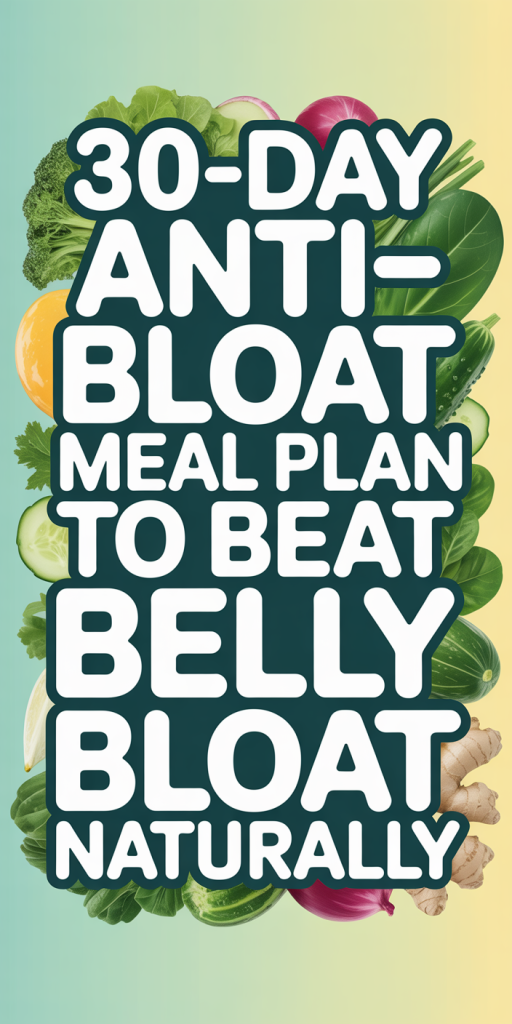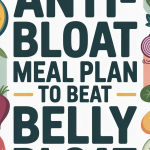30-Day Anti-Bloat Meal Plan: Beat Belly Bloat Naturally with These Easy Recipes
Belly bloat can be uncomfortable and frustrating, affecting everything from your confidence to your daily activities. I’ve been there, feeling sluggish and self-conscious after indulging in foods that just don’t sit right. That’s why I’ve created a 30-day anti-bloat meal plan designed to help you beat the bloat naturally and reclaim your well-being.
Understanding Belly Bloat
Belly bloat affects many and can lead to discomfort, impacting daily life and self-esteem. Understanding its causes and symptoms helps in tackling this issue effectively.
Common Causes of Belly Bloat
- Dietary choices: Consuming high-sodium foods, carbonated drinks, or excessive fiber can lead to bloating.
- Food intolerances: Lactose or gluten intolerance may cause gas and swelling after consuming specific foods.
- Overeating: Eating large portions can overwhelm the digestive system, resulting in bloating.
- Gut bacteria: An imbalance in gut flora may contribute to gas production, leading to abdominal fullness.
- Hormonal changes: Fluctuations during menstruation or menopause can cause temporary bloating.
Symptoms and Effects on Health
- Distended abdomen: A visibly swollen belly that can feel tight or uncomfortable.
- Gas and discomfort: Increased flatulence and abdominal pain accompany bloating.
- Digestive issues: Constipation or diarrhea may arise due to digestive disturbances.
- Fatigue: Persistent bloating can lead to feelings of sluggishness and reduced energy levels.
- Emotional impact: Experiencing bloating can affect mood and self-image, leading to anxiety or decreased confidence.
The Importance of an Anti-Bloat Meal Plan
An anti-bloat meal plan plays a crucial role in managing belly bloat effectively. It empowers individuals to choose foods that promote digestive health while eliminating those that contribute to discomfort and bloating.
Benefits of a Structured Meal Plan
- Promotes Consistency: A structured meal plan provides a clear framework for meals and snacks, ensuring balanced nutrient intake.
- Reduces Decision Fatigue: Planning meals removes the stress of last-minute food choices, leading to healthier, intentional selections.
- Enhances Nutrient Awareness: Individuals gain insight into the nutritional content of foods, helping identify beneficial and problematic items.
- Improves Portion Control: A defined plan encourages appropriate serving sizes, which prevents overeating and mitigates bloating.
- Supports Healthy Habits: Adhering to a meal plan fosters routine, making it easier to transition to healthier eating patterns long-term.
How It Helps with Digestion
An anti-bloat meal plan optimizes digestion by incorporating digestive-friendly foods and avoiding common irritants.
- Incorporates Fiber: Foods rich in soluble fiber, like oats and bananas, promote regular bowel movements and reduce gas buildup.
- Includes Probiotics: Sources like yogurt and fermented vegetables support healthy gut bacteria, improving overall digestive function.
- Minimizes Trigger Foods: Identifying and eliminating foods that cause bloating—such as dairy, gluten, and high FODMAP items—enhances digestive comfort.
- Encourages Hydration: Sufficient water intake aids in digestion, helping to prevent constipation and bloating.
- Balancing Macronutrients: A balanced intake of carbohydrates, proteins, and healthy fats optimizes digestion, stabilizing blood sugar levels and reducing digestive stress.
Components of the 30-Day Anti-Bloat Meal Plan to Beat Belly Bloat Naturally
The 30-day anti-bloat meal plan includes essential ingredients and foods to avoid, promoting effective management of belly bloat. Identifying these components enhances overall digestive health and comfort.

Key Ingredients to Include
- Leafy Greens: I include spinach, kale, and Swiss chard for their high fiber and mineral content.
- Lean Proteins: I opt for chicken breast, turkey, and tofu, which provide essential amino acids without excess fat.
- Healthy Fats: I use avocados, nuts, and olive oil to promote satiety and support nutrient absorption.
- Fruits: I select berries, bananas, and kiwis, which are gentle on the stomach and rich in vitamins and antioxidants.
- Whole Grains: I incorporate quinoa, brown rice, and oats for their fiber content, aiding in digestion and maintaining steady energy levels.
- Fermented Foods: I add yogurt, kefir, and sauerkraut, which provide beneficial probiotics that support gut health.
Foods to Avoid
- Processed Foods: I avoid items high in additives and preservatives that may irritate the digestive system.
- Dairy Products: I limit cheese, milk, and ice cream to reduce lactose-related bloating for those with sensitivities.
- Legumes: I cut back on beans and lentils, as they can cause gas and bloating due to their high fiber and carbohydrate content.
- Sugary Foods: I steer clear of candies, baked goods, and sugary snacks to prevent spikes in blood sugar and digestive discomfort.
- Carbonated Beverages: I refrain from sodas and fizzy drinks, as they can introduce gas and lead to bloating.
- Refined Grains: I eliminate white bread and pasta, opting for whole grains to ensure better digestion and nutrient absorption.
Sample 30-Day Anti-Bloat Meal Plan
This 30-day anti-bloat meal plan provides a structured approach to help combat belly bloat naturally. Following a weekly breakdown helps ensure variety and balance while keeping meals enjoyable.
Weekly Breakdown of Meals
Here’s a weekly breakdown to guide daily meal choices:
| Week | Breakfast | Lunch | Dinner | Snacks |
|---|---|---|---|---|
| 1 | Overnight oats with chia seeds | Spinach salad with grilled chicken | Quinoa and roasted vegetables | Almonds, cucumber slices |
| 2 | Smoothie with spinach and banana | Brown rice with steamed broccoli | Baked salmon with asparagus | Carrot sticks, hummus |
| 3 | Greek yogurt with berries | Lentil soup with kale | Stir-fried tofu with bok choy | Rice cakes, guacamole |
| 4 | Scrambled eggs with tomatoes | Couscous salad with chickpeas | Grilled turkey with zucchini | Apple slices, nut butter |
Each week emphasizes whole foods, lean proteins, and fiber-rich options, which contribute to digestive health and lessen bloating.
Tips for Meal Prep and Planning
Efficient meal prep can simplify stick to this anti-bloat plan:
- Plan weekly: Dedicate a specific day for meal planning and shopping.
- Prep in batches: Cook larger portions of grains and proteins for quick reheating.
- Use containers: Store pre-portioned meals and snacks for easy grab-and-go options.
- Label everything: Mark containers with dates to track freshness and reduce waste.
- Incorporate variety: Rotate ingredients within the same food groups to stay interested and satisfied without repeating meals.
Staying organized and maintaining flexibility in choices while following the plan helps ensure a successful anti-bloat journey.
Lifestyle Changes to Complement the Meal Plan
Incorporating lifestyle changes enhances the effectiveness of the 30-day anti-bloat meal plan. I focus on hydration and movement as key components to support digestive health.
Importance of Hydration
Staying hydrated aids digestion and reduces bloating. Drinking adequate water helps flush out toxins and maintains healthy gut function. I aim for at least 64 ounces of water daily, adjusting for activity levels and climate. Herbal teas, such as peppermint and ginger, also promote digestion and provide soothing effects. I limit diuretics like caffeine and alcohol, which can contribute to dehydration and bloating.
Role of Exercise and Movement
Regular exercise promotes gut motility and reduces bloating. Engaging in aerobic activities, like walking or cycling, encourages digestion and relieves abdominal pressure. Strength training further supports muscle tone, which can improve posture and reduce bloating. I set a goal for at least 150 minutes of moderate exercise weekly, breaking it into manageable sessions. Incorporating gentle stretching or yoga helps alleviate stress and enhances relaxation, both of which positively impact digestion.
Conclusion
Embracing a 30-day anti-bloat meal plan has been a game changer for my digestive health. By focusing on whole foods and avoiding common triggers I’ve noticed a significant reduction in bloating and discomfort. This journey isn’t just about the food; it’s also about making mindful choices that support my overall well-being.
Staying hydrated and incorporating movement into my daily routine has further enhanced my results. I encourage you to give this meal plan a try and experience the benefits for yourself. With consistency and a little planning you’ll be well on your way to beating belly bloat naturally and feeling your best.






